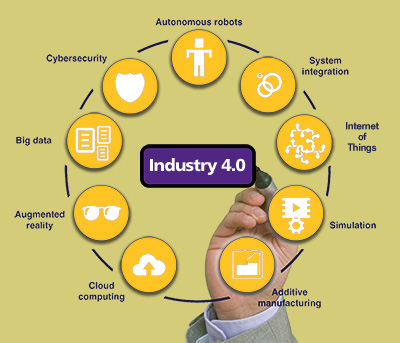Industry 4.0 : Manufacturing’s shares in Europe
Industry 4.0 is set to drive up manufacturing’s share of GDP in Europe by 20 per cent over the next five years.
With its expertese in software and sensors, the UK has a golden ticket. The UK is still wondering what to put in its suitcase, while China, Japan, South Korea and the USA march up the gangplank, with the Germans already putting their
Also Read: Top 10 Fantasy Cricket Apps List in 2024
That’s if you take heed of a survey published earlier this year by Works Management and software firm Infor which finds that six in 10 UK manufacturing managers have never
even heard of Industry 4.0 and 47 percent of those surveyed say their top priority is people management. Meanwhile, German hardware is forging deals with Chinese software: Kuka, one of the world’s biggest industrial RPA companies is getting ready to develop a smart manufacturing platform in collaboration with
The pair are planning nothing less than a global network – built on the industrial internet of things – to enable the connection of robots across many factories - with
Artificial intelligence and deep learning integrated within the system. Another German firm, Bosch, is looking to the United States for state-of-the-art IoT (Internet of Things) technology.
It has 3,000 software engineers working on IoT, and has developed its own software platform for smart factories, called IoT Suite, which lets companies connect production machinery on an Are UK manufacturers treading too lightly around this new revolution or are they, in fact, implementing Industry 4.0 practices and technology, but calling it something else?
member of the ESCO Industry 4.0 workstream, in new electronics, “but what we are seeing is a significant move towards greater automation and machine intelligence which is driving manufacturers to
The fact is that UK factories are getting smarter and it’s the food industry that is leading the charge.
UK-based Arla Foods, for instance, boasts automated guided vehicles (AGVs) which transport milk from the production line onto dispatch tracks.
The AGVs communicate with one another and line-side equipment to ensure they’re in the right place at the right time. Arla claims that its product is 100 per cent error-free, and that’s largely due to this kind of automation—automation that looks like classic Industry 4.0.
Take a look, for example, at HARTING Integrated Solutions (HIS), based in Northampton, which designs and manufactures backplanes and backplane systems for customer-specific applications. It offers solutions associated with Industry 4.0 to enable integrated industry, primarily connectivity products that combine power, signal and data.
They additionally employ an Industry 4.0 modular manufacturing approach that uses RFID readers and tags to manage and monitor production.
Customers can place orders online using the company’s eShop and, via its SAP system factory cells, can combine items to provide different frames, modular assembly and labelling.
Products are thus customised, can be produced quickly and efficiently and in very small batches, a key characteristic of Industry 4.0
The £45m ‘reconfigurable’ enterprise will eventually employ about 70 people and boasts cutting edge manufacturing and assembly technologies, including advanced robotics, flexible automation, next-generation man-machine interfaces, and reconfigurable data-driven.
It only opened in January and the team from the University of Sheffield’s Advanced
- it’s gearing up to revolutionise UK industry with technologies that include virtual reality, robotics and Blockchain technology.
Part of a collaboration between Boeing and The Advanced Manufacturing Research Centre (AMRC), it’s been dubbed ‘one of the most advanced factories in the world.’
Final Thoughts
This automated factory will generate huge volumes of data with all its cameras, lasers and other sensors. It will retool on the fly, digitally swapping out parts of the production line to model changes for a perpetual hunt for efficiency. Using blockchain, it will track and certify the path of raw materials, ensuring provenance and quality. It’s hoped that the factory will be a hub for design and manufacture in a variety of sectors, with involvement from major players like Boeing, Rolls-Royce, Hitachi and Microsoft.



Hashstudioz Technologies bring the emerging technologies under Industry 4.0 with solutions in System Integration, Data Analytics & Cloud Computing , IIoT, Predictive Maintenance, Data Traceability. Industry 4.0 involves the networking of all instances involved in value creation, as well as the ability to derive the best possible value stream from data in real-time. Get a free consultation & wire-frames done from our team of experts.
ReplyDelete